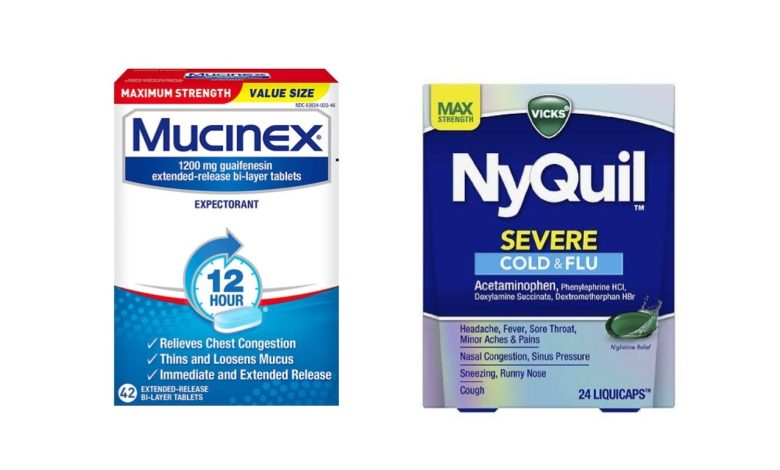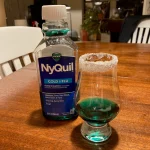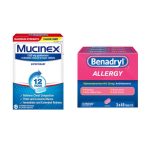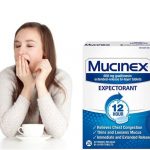Can You Take Mucinex and NyQuil Together?

When the cold and flu season hits, it’s not uncommon to reach for over-the-counter medications to relieve the unpleasant symptoms that come with these illnesses. Two popular choices are Mucinex and NyQuil, each designed to address specific symptoms. However, when it comes to combining medications, you must exercise caution to ensure your health and safety.
Understanding Mucinex and NyQuil
Before delving into whether it’s safe to take Mucinex and NyQuil together, let’s understand what each of these medications does:
Mucinex (Guaifenesin): Mucinex contains guaifenesin as its active ingredient. Guaifenesin is an expectorant, which means it helps to thin and loosen mucus in the airways. This can make it easier for you to cough up and clear mucus from your respiratory system. It is commonly used to alleviate chest congestion and productive coughs.
NyQuil: NyQuil is a popular over-the-counter cold and flu medication that typically contains multiple active ingredients. These often include a pain reliever/fever reducer (such as acetaminophen or ibuprofen), a cough suppressant (dextromethorphan), and an antihistamine (doxylamine succinate). NyQuil is formulated to provide relief from various cold and flu symptoms, including fever, cough, congestion, and a runny nose.
The Key Question: Can They Be Taken Together?
The short answer is yes, it is generally safe to take Mucinex and NyQuil separately as directed on their respective labels. Both medications serve different purposes, and there is no inherent chemical interaction between guaifenesin (Mucinex) and the active ingredients in NyQuil. However, you should avoid taking Mucinex DM and Nyquil together because of their shared common ingredient, dextromethorphan. To ensure your safety and avoid the risk of double-dosing on this ingredient, it’s recommended to opt for Nyquil alone, which already contains a combination of active ingredients designed to address a variety of cold and flu symptoms.
Cautions and Considerations
While combining these medications is generally considered safe, there are a few cautions and considerations to keep in mind:
1. Ingredient Overlap: Check the labels of both medications to see if there is any overlap in their active ingredients. For example, if NyQuil already contains a cough suppressant (dextromethorphan), taking Mucinex to address a cough may result in doubling up on this particular effect. In such cases, you might want to choose a version of NyQuil that does not contain a cough suppressant or select a separate single-ingredient product to treat your specific symptom.
2. Individual Tolerance: Everyone’s response to medications can vary. Some people may be more sensitive to the effects of certain ingredients, so pay attention to how your body reacts to taking both medications together. If you experience adverse effects or an unexpected reaction, discontinue use and seek medical advice.
3. Follow the Dosage Instructions: Always adhere to the recommended dosage instructions on the product labels. Overdosing on any medication can be dangerous and may lead to adverse effects.
4. Consult a Healthcare Professional: If you have any doubts or concerns about potential interactions or the safety of taking Mucinex and NyQuil together, it’s wise to consult with a healthcare professional, such as a pharmacist or doctor. They can provide you with personalized guidance based on your health and medical history.
5. Alternative Medication Choices: Depending on your specific symptoms and needs, you may want to explore alternative medication options that are better suited to your condition. A healthcare professional can help you make an informed choice.
Side Effects of Mucinex and NyQuil
Both Mucinex and NyQuil can have potential side effects, as is the case with many medications. It’s important to be aware of these side effects, although not everyone will experience them, and they may vary in severity. Below are some of the common side effects associated with Mucinex and NyQuil:
Common Side Effects of Mucinex (Guaifenesin):
1. Nausea: Some individuals may experience mild nausea after taking Mucinex. It’s usually helpful to take the medication with food or a full glass of water to reduce this effect.
2. Vomiting: In rare cases, Mucinex may cause vomiting, especially if it is not taken with sufficient fluids or if the dosage is exceeded.
3. Dizziness: Dizziness can occur as a side effect of Mucinex, although this is not very common.
4. Stomach Upset: Some people may experience stomach discomfort or an upset stomach after taking Mucinex.
5. Headache: Headaches are a less common side effect of Mucinex.
Common Side Effects of NyQuil (Various Formulations):
NyQuil is available in various formulations, each with its own combination of active ingredients. Common side effects may vary depending on the specific formulation you’re using, but here are some general side effects to be aware of:
1. Drowsiness: Many NyQuil formulations contain antihistamines like doxylamine succinate, which can cause drowsiness. This drowsiness can be quite pronounced, and it’s important not to drive or operate heavy machinery while using NyQuil.
2. Dry Mouth: Dry mouth is a common side effect of antihistamines and can be associated with NyQuil use.
3. Upset Stomach: Some people may experience an upset stomach or gastrointestinal discomfort when taking NyQuil.
4. Nausea: Nausea is another possible side effect, although it is not experienced by everyone.
5. Dizziness: Dizziness or lightheadedness can occur with certain NyQuil formulations, especially if taken in higher doses.
6. Confusion or Cognitive Impairment: NyQuil’s drowsiness-inducing properties can sometimes lead to cognitive impairment and confusion, especially in older adults.
7. Allergic Reactions: In rare cases, individuals may experience an allergic reaction to any of the components in NyQuil, which can include symptoms like rash, itching, swelling, severe dizziness, or difficulty breathing. Seek immediate medical attention if you experience such symptoms.
It’s important to read the labels of these medications carefully, follow the dosing instructions, and be aware of any potential interactions with other medications you may be taking. If you experience severe or unusual side effects, or if you have any concerns about using these medications, consult with a healthcare professional for guidance and possible alternatives.
In Conclusion
Mucinex and NyQuil can be used together in most cases, provided you are mindful of ingredient overlap and follow the recommended dosages. However, it’s essential to prioritize your health and safety by consulting a healthcare professional when in doubt. Always listen to your body and seek medical advice if you experience any unexpected or adverse effects when taking these medications. READ: Does Nyquil Expire?





